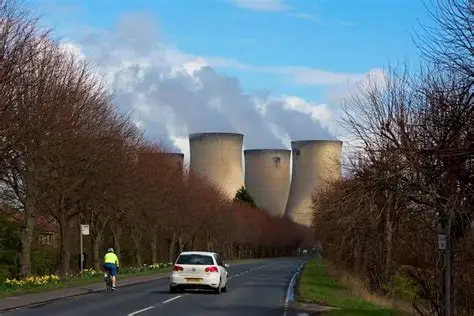In the environmental policy, the proposal by the Conservative Party to repeal the UK’s Climate Change Act marks a dramatic pivot. Given the importance of that Act as a legal backbone for emissions targets, energy investment, and investor confidence, the reaction from industry groups matters. When RenewableUK — the trade body for the wind and clean energy sector — issues a public critique, it signals that the proposal could have serious implications for the clean energy sector, business investment, and the UK’s climate credibility. Exploring their view helps to unpack the practical and political stakes of this move.

Climate Change Act: Background and Current Development
For reducing greenhouse gas emissions, which includes the carbon budgets and the role of the independent Climate Change Committee, the Climate Change Act (2008) established a legally binding framework. It has been strengthened over the successive governments, which include commitments to net zero by 2050.
In October 2025, Conservative leader Kemi Badenoch vowed to repeal the Climate Change Act, disputing that it has increased energy costs, forced official loads, and unsuccessful to deliver cuts in worldwide emissions.

In response, RenewableUK unconfined a public announcement through its Deputy Chief Executive Jane Cooper, which warns that arguing the Act would weaken self-reliance in asset and destabilise the clean energy sector.
Other voices have considered it too, like the scientists, business groups (e.g., the CBI), and climate critics have cautioned that undoing legitimate climate vows would damage the UK’s integrity, discourage investment, and hazard locking in confidence in fossil fuels.

Jane Cooper (Deputy Chief Executive) stated: “The Conservatives would be wrong to row back on their commitment to net zero, as this would mean turning their backs on one of our greatest opportunities to maximise economic growth this century … The UK’s green economy grew by 10% between 2023 and 2024 … business supporting over 950,000 jobs. … It’s also a mistake to suggest that it isn’t possible to reach net zero by 2050.”
Climate Change Act: Key Interpretive Themes
- Legal Certainty Vs Policy Volatility

RenewableUK emphasizes that the Climate Change Act acts as a guarantee, and companies plan multi-year investments in infrastructure, manufacturing, supply chains, and research. Cancelling it introduces uncertainty, making long lead times, project financing, and risk valuations rigid.
- Signal to Domestic & International Investors

The Act is not just a domestic tool, but a signal that the UK is serious about climate commitments. RenewableUK warns that removing it would disappoint investors and possibly deter capital inflows into the sector at a time when global clean energy investment is intensifying.
- Jobs and Supply Chain Impacts
The trade body frames the clean energy sector as an engine of growth and employment. Without a legal anchor, supply chains could fragment, skills investment may slow, and firms might relocate or reduce activity.
- Cost & Billpayer Implications
RenewableUK maintains that renewables are already competitive, and that further scale can bring down costs. They argue open debate on electricity costs should not mean abandoning renewables. But critics might point to transitional costs, grid upgrade investments, or periods of mismatch between supply and demand.
Dr Jess Neumann:
“Plans such as abandoning the UK’s commitment to net‑zero by 2050 and maximising extraction of North Sea oil and gas fly in the face of the scientific evidence …”
- Risk of Losing Momentum & Relapsing to Fossil Fuels
If the legitimate agenda is pulled to pieces, policy growth (e.g., of offshore wind, green hydrogen, carbon capture) may lose steam. There is a risk of renewed investment in gas, oil, or coal to fill apparent gaps, which could lock in emissions over dangerous decades.
- Political & Credibility Costs
The move may be seen as a political move rather than a righteous plan. Opponents have warned that it will deteriorate the UK’s standing in global climate forums and weaken the cross-party agreement built over time.
SNAPSHOT Table: RenewableUK’s Comment
| Point | Summary |
| Investor confidence | Abolishing the Act would undermine investor confidence in clean energy. |
| Jobs at risk | Nearly 1 million jobs are supported by the net-zero economy; repeal could threaten this. |
| Fast-growing sector | Clean energy is growing faster than the overall economy. |
| Energy security | Home-grown renewables boost security and cut bills—the Act supports that. |
| Open to dialogue | RenewableUK says it will work with any government to deliver clean energy. |
Professor Benoit Mayer:
“Repealing this major piece of legislation would send a terrible message to the world … It would also be a short‑sighted move from an economic perspective as it would hinder the development of a highly lucrative green industry in the country.”
Climate Change Act: Paths Forward & Stakeholder Suggestions
To avoid the risks flagged by RenewableUK — and to ensure any policy evolution is credible — the following approaches might help:
- Transparent Replacement Legislation
If abolition is proposed, governments must present a clear, binding alternative legal framework for emissions and energy investment, rather than leaving a policy void.
- Gradual Transition Plans
Use phased adjustments rather than abrupt repeal — e.g., retain carbon budgets or incremental limits while reworking mechanisms to reduce perceived burdens.
- Safeguards for Investors & Contracts
Guarantee grandfathering of current projects, maintain obligations on emissions or performance standards for existing contracts, and institute strong regulatory oversight.
- Strengthening Sector Engagement
Engage RenewableUK, financial institutions, and industry groups in co-designing the next framework to preserve stability and avoid backlash.
- Mechanisms to De-Risk Deployment
Public guarantees, risk sharing, supply chain incentives, and transitional subsidies can help maintain momentum during regime change.
- Regional & Social Transition Measures
Protect the community’s dependence on fossil industries, ensure retraining, and redirect investment to avoid regional economic disruption.
- Maintain International Commitments
Even if domestic law changes, uphold arrangements with international agreements (e.g., Paris targets) to preserve access to green capital and political integrity.
CBI (Confederation of British Industry) — in response to calls to abolish the Climate Change Act, CBI Chief Executive Rain Newton‑Smith said:
“The Climate Act has been the bedrock for investment flowing into the UK … Businesses delivering the energy transition added £83 ban to the economy last year alone, providing high‑paying jobs to almost a million people across the UK.”
FAQs
What is the reason behind the opposition to abolishing the Climate Change Act?
RenewableUK has faith in arguing that the Act intimidates long-term stockholder self-reliance in the UK’s renewable energy market and weakens the country’s officially obligatory net-zero target.
Who is Jane Cooper, and what has she said?
Jane Cooper is RenewableUK’s Deputy CEO. She has condemned the proposal to abolish the Climate Change Act as a mistake that jeopardizes future generations.
What is RenewableUK’s opinion on the Conservatives’ energy policy?
RenewableUK assesses the policy’s inconsistent nature, as it concurrently impels renewables while increasing fossil fuels, endangering energy security, and failing to attain actual decarbonisation.
Does RenewableUK assume that the fuels are cheaper than the renewables?
No. RenewableUK refers to research displaying that wind power lowers electricity prices and struggles that sustained dependence on unstable fossil fuels will lead to higher energy bills.

